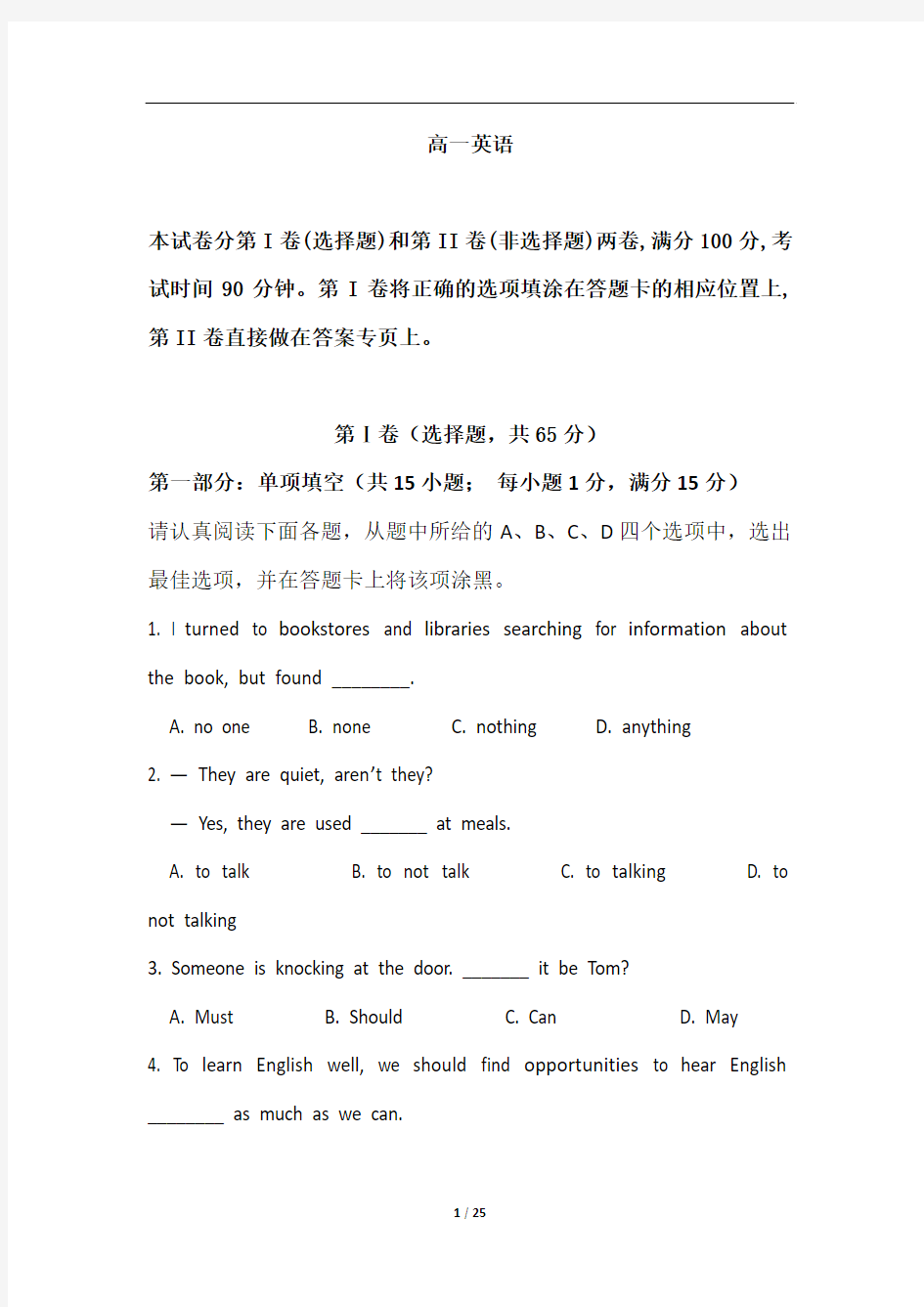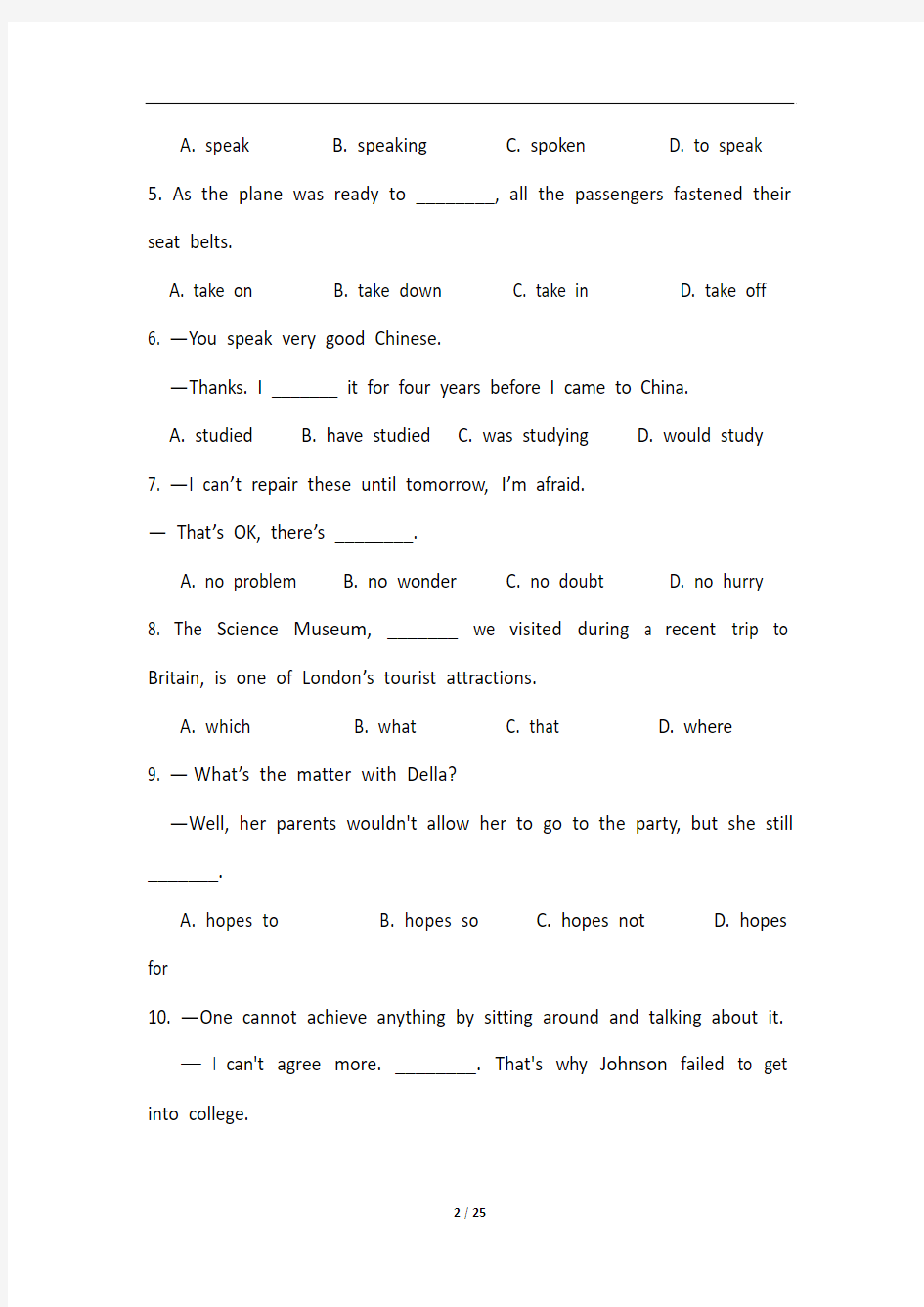

高一英语
本试卷分第I卷(选择题)和第II卷(非选择题)两卷,满分100分,考试时间90分钟。第I卷将正确的选项填涂在答题卡的相应位置上,第II卷直接做在答案专页上。
第Ⅰ卷(选择题,共65分)
第一部分:单项填空(共15小题;每小题1分,满分15分)
请认真阅读下面各题,从题中所给的A、B、C、D四个选项中,选出最佳选项,并在答题卡上将该项涂黑。
1. I turned to bookstores and libraries searching for information about the book, but found ________.
A. no one
B. none
C. nothing
D. anything
2. — They are quiet, aren’t they?
— Yes, they are used _______ at meals.
A. to talk
B. to not talk
C. to talking
D. to not talking
3. Someone is knocking at the door. _______ it be Tom?
A. Must
B. Should
C. Can
D. May
4. To learn English well, we should find opportunities to hear English ________ as much as we can.
A. speak
B. speaking
C. spoken
D. to speak
5. As the plane was ready to ________, all the passengers fastened their seat belts.
A. take on
B. take down
C. take in
D. take off
6. —You speak very good Chinese.
—Thanks. I _______ it for four years before I came to China.
A. studied
B. have studied
C. was studying
D. would study
7. —I can’t repair these until tomorrow, I’m afraid.
— That’s OK, there’s ________.
A. no problem
B. no wonder
C. no doubt
D. no hurry
8. The Science Museum, _______ we visited during a recent trip to Britain, is one of London’s tourist attractions.
A. which
B. what
C. that
D. where
9. —What’s the matter with Della?
—Well, her parents wouldn't allow her to go to the party, but she still _______.
A. hopes to
B. hopes so
C. hopes not
D. hopes for
10. —One cannot achieve anything by sitting around and talking about it.
—I can't agree more. ________. That's why Johnson failed to get into college.
A. A book is a garden carried in the pocket
B. An old pan is the one that makes good food
C. A roaring lion kills no game
D. A bad workman always blames his tools
11. Massive open online courses(MOOC) provide a wonderful model of ______ we call high-tech learning.
A. which
B. why
C. what
D. how
12. She was so tired that she ________ asleep during the class.
A. became
B. turned
C. grew
D. fell
13. The situation is serious. Something must be done ________ it's too late.
A. after
B. before
C. when
D. since
14. —Hello, Jack! Do you think you can give me a ________ to the station? I must go there to pick my sister.
—I'm terribly sorry, but I can't. I have to be at work by 8:30.I can call you a taxi, though.
A. call
B. hand
C. lift
D. chance
15. —I am sorry, I need to answer the call of nature.
—No problem, _________.
A. go ahead
B. it’s up to you
C. take your time
D. glad to hear that
第二部分:完形填空(共20小题;每小题1分,满分20分)
请认真阅读下面短文,从短文后各题所给的A、B、C、D四个选项中,选出最佳选项,并在答题卡上将该项涂黑。
My kids and I were heading into the supermarket over the weekend. On the way, we saw a man holding a piece of paper that said, “__16___ my job. Family to Feed.”
At this store, a __17___ like this is not normal. My 10-year-old noticed him and made a __18____ on how bad it must be to have to stand ___19____ in the cold wind.
In the store, I asked each of my kids to __20___ something they thought our “friend” there would ___21___. They got apples, a sandwich and a bottle of juice. Then my 17-year-old suggested giving him a ___22____. I thought about it. We were ___23__ on cash(现金) ourselves, but… well, sometimes __24___ from our need instead of our abundance(富足) is ___25__ what we need to do! All the kids __26____ something they could do away with废除,去掉,可以不要的for the week.
When we handed him the bag of __27__, he lit up and thanked us with ___28__ eyes. When I handed him the gift card, saying he could use it for __29____his family might need, he burst into tears.
This has been a wonderful ___30__ for our family. For days the kids have been looking for others we can __31___! Things would have played out so __32____ if I had simply said, “No, we really don’t have ___33___ to give mor e.” Stepping out not only helped a brother in __34___, it also gave my kids the __35____ taste of helping others. It’ll go a long way with them.
16. A. Lost B. Changed C. Quit D. Finished
17. A. condition B. place C. sight D. show
18. A. suggestion B. comment C. decision D. call
19. A. outside B. proudly C. by D. angrily
20. A. draw B. say C. arrange D. pick
21. A. order B. supply C. appreciate D. discover
22. A. dollar B. job C. hot meal D. gift card
23. A. easy B. low (缺乏,含量低) C. soft D. loose
24. A. giving B. saving C. spending D. begging
25. A. yet B. even C. still D. just
26. A. declared B. shared C. ignored D. expected
27. A. toys B. medicine C. food D. clothes
28. A. sleepy B. watery C. curious D. sharp
29. A. whoever B. whatever C. whichever D. whenever
30. A. experience B. example C. message D. adventure
31. A. rely on B. respect C. learn from D. help
32. A. suddenly B. vividly C. differently D. perfectly
33. A. time B. power C. patience D. money
34. A. fear B. love C. need D. memory
35. A. strong B. sweet C. strange D. simple
第三部分:阅读理解(共15小题;每小题2分,满分30分)
请认真阅读下列短文,从短文后各题所给的A、B、C、D四个选项中,选出最佳选项,并在答题卡上将该项涂黑。
A
Usually, when your teacher asks a question, there is only one correct answer. But there is one question that has millions of correct answers. That question is “What’s your name?” Everyone gives a different answer, but everyone is correct.
Have you ever wondered about people’s names? Where do they come from? What do they mean?
People’s first names, or given names, are chosen by their parents. Sometimes the name of a grandparent or other member of the family is used. Some parents choose the name of a well-known person. A boy
could be named George Washington Smith; a girl could be named Helen Keller Jones.
Some people give their children names that mean good things. Clara means “bright”; Beatrice means “one who gives happiness”; Donald means “world ruler”; Leonard means “as brave as a lion”.
The earliest last names, or surnames, were taken from place names.
A family with the name Brook or Brooks probably lived near brook(小溪); someone who was called Longstreet probably lived on a long, paved road. The Greenwood family lived in or near a leafy forest.
Other early surnames came from people’s occupations. The most common occupational name is Smith, which means a person who makes things with iron or other metals. In the past, smiths were very important workers in every town and village. Some other occupational names are: Carter— a person who owned or drove a cart; Potter— a person who made pots and pans.
The ancestors of the Baker family probably baked bread for their neighbors in thei r native village. The Carpenter’s great-great-great-grandfather probably built houses and furniture.
Sometimes people were known for the color of their hair or skin, or their size, or their special abilities. When there were two men who were named John in the same village, the John with the gray hair probably
became John Gray. Or the John was very tall could call himself John Tallman. John Fish was probably an excellent swimmer and John Lightfoot was probably a fast runner or a good dancer.
Some family name s were made by adding something to the father’s name. English-speaking people added–s or –son. The Johnsons are descendants of John; the Roberts family’s ancestor was Robert. Irish and Scottish people added Mac or Mc or O. Perhaps all of the MacDonnells a nd the McDonnells and the O’Donnells are descendants of the same Donnell.
36. Which of the following aspects do the surnames in the passage NOT cover?
A. Places where people lived.
B. People’s characters.
C. Talents that people possessed.
D. People’s occupations.
37. According to the passage, the ancestors of the Potter family most probably _______.
A. owned or drove a cart
B. made things with metals
C. made kitchen tools or containers
D. built houses and furniture
38. Suppose and English couple whose ancestors lived near a leafy forest wanted their new-born son to become a world leader, the baby might be named _______.
A. Beatrice Smith
B. Leonard Carter